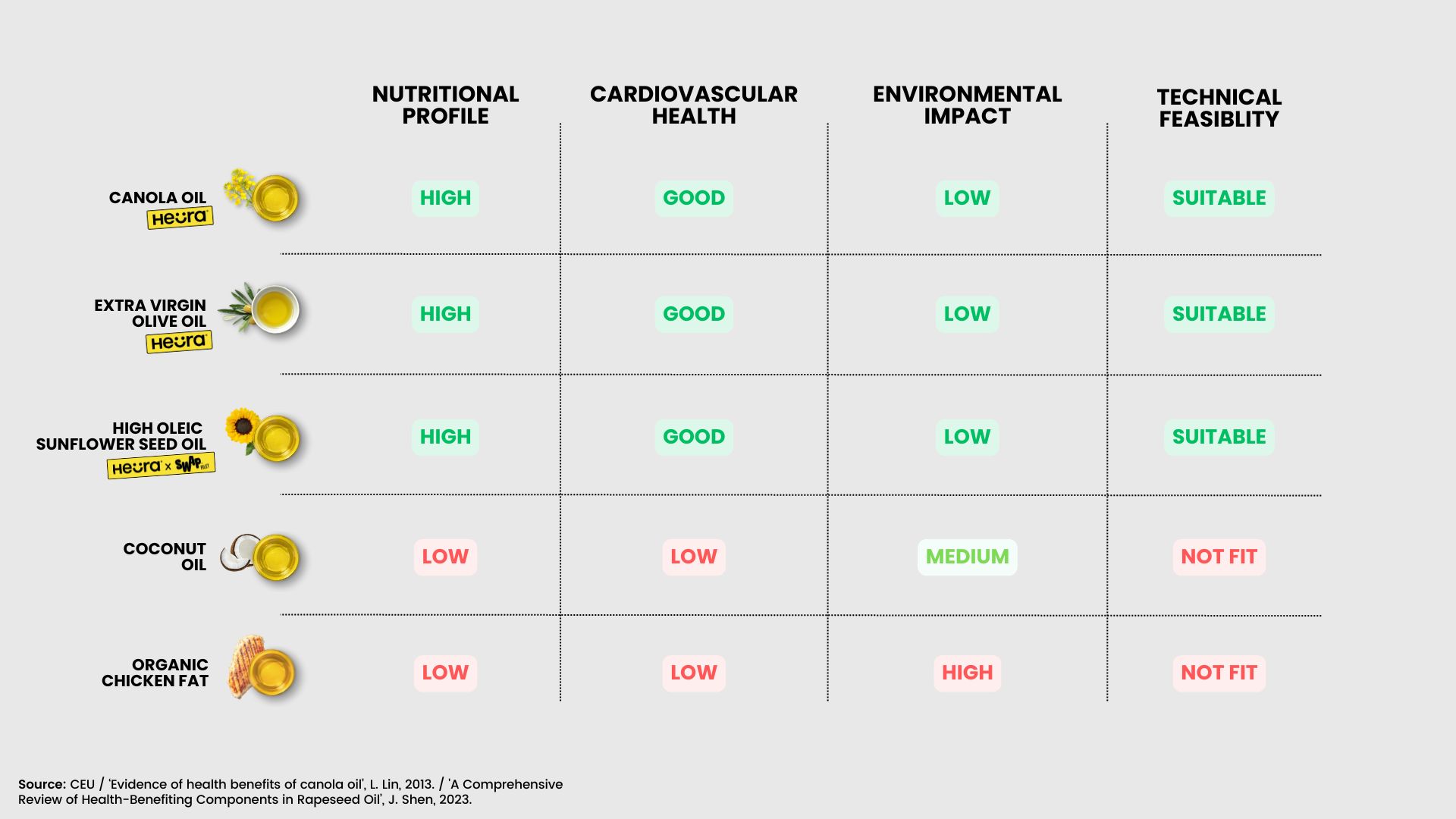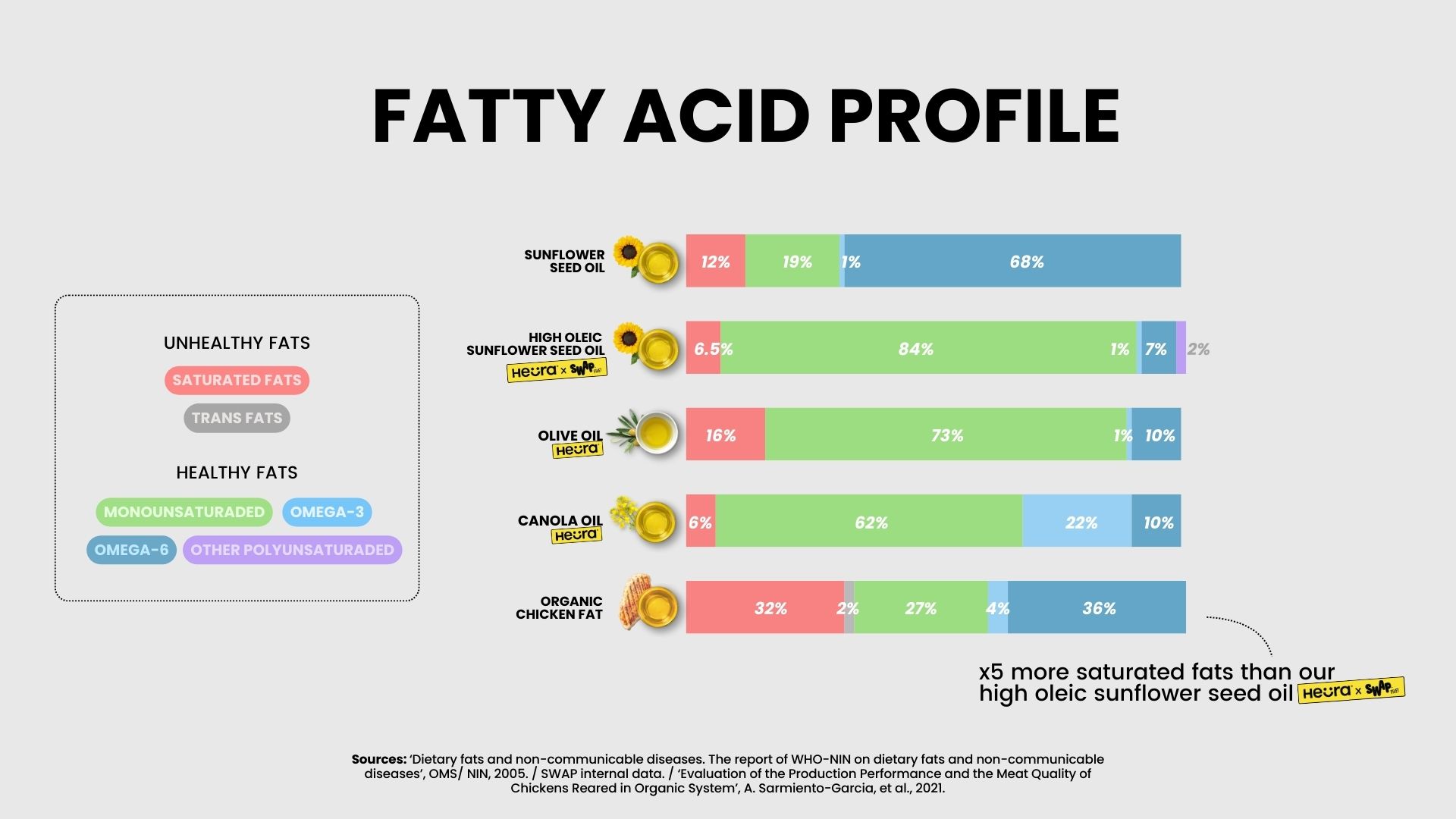
OUR OILS: HEALTHY FATS
In our own products, we use extra virgin olive oil (in all of them) and rapeseed oil.
- EXTRA VIRGIN OLIVE OIL 🫒
This is the best known and the one whose benefits we know the most. So here we're going to focus on the lesser-known ones. One day we'll get around to providing more information about this one as well, as there are always new things to learn.
- RAPESEED OIL 🌼
One of our key ingredients, extra virgin olive oil (EVOO), has increased its price by 200% since 2021. A few months ago, this put us in a difficult position where we had to choose between reformulating our recipes, raising prices, or stopping production of several products.
We chose the first option. When we set out to find an alternative to extra virgin olive oil, we set some minimum requirements: it had to have an equal or better nutritional profile, it had to have a positive impact on cardiovascular health and cholesterol, it had to have a low environmental impact, and it had to be technically suitable (not affect the organoleptic characteristics of our products and fit well into our production line).
After months of study and analysis, we found a solution that allowed us to maintain the use and benefits of extra virgin olive oil, as well as the flavor and texture of our products, without raising prices and even, to our surprise, improving their nutritional values in many cases. This solution consisted of combining our current extra virgin olive oil with rapeseed oil, a high-quality monounsaturated oil low in saturated fat.

This is just one example of how we constantly strive to balance the global economic climate with our mission to continue innovating, improving, and offering scalable solutions, multiplying the positive impact on the planet, animals, and people's health, while ensuring economic sustainability so we can continue to exist and work to change the food system.
Why did we choose this oil?
We love our extra virgin olive oil, but when faced with the need to find a solution, we discovered that rapeseed oil perfectly complements our current extra virgin olive oil.
Rapeseed oil has a very complete nutritional profile. On the one hand, it is one of the common oils with the lowest saturated fat content. It has a good content of good fats (MUFAs), in similar quantities to extra virgin olive oil (EVOO). Furthermore, it is one of the commercial oils with the highest omega-3 content and the best omega-3/omega-6 balance.

What are the benefits of rapeseed oil?
- Longer life expectancy: Large-scale prospective studies analyzing the health effects of different types of fats show that rapeseed oil reduces the risk of mortality. In fact, replacing one tablespoon of butter daily with rapeseed oil reduces the risk of mortality by 6%. This is similar to extra virgin olive oil, which reduces it by 7%.
- Improves cardiovascular health: The same meta-analysis showed that consuming rapeseed oil reduces the risk of cardiometabolic mortality. In fact, replacing every tablespoon of butter daily with rapeseed oil reduces the risk of heart disease by 7%. Extra virgin olive oil also reduces the risk by 7%.
- Reduction of saturated fats and cholesterol: Replacing saturated fatty acids (SFAs) with monounsaturated fatty acids (MUFAs) such as oleic acid, found in rapeseed oil, can reduce low-density lipoprotein cholesterol (LDL-C) levels and decrease the risk of coronary heart disease (CHD) by 20–40%. Diets based on rapeseed oil were found to reduce LDL cholesterol by an average of 8.9% compared to diets using vegetable oils high in SFAs such as palm or coconut oil.
- Anti-inflammatory effects: Rapeseed oil contains vitamin E and phytosterols, which have antioxidant and anti-inflammatory effects. Rapeseed oil may reduce clotting factors such as factor VII and fibrinogen, suggesting a potential to reduce the risk of thrombosis (blood clot formation).
- Supports Immune Function: Some evidence suggests that rapeseed oil may help normalize the immune response in critically injured patients.
- Improves Insulin Sensitivity: Replacing saturated fats with monounsaturated fats (MUFAs) in rapeseed oil may improve insulin sensitivity and glycemic control.
Frequently Asked Questions:
Which products contain this blend of extra virgin olive oil and rapeseed oil?
Burgers, Snacks, Nuggets, Slices, and Breaded Escalopes.
If it's so healthy, why does it have such a bad reputation?
There is a lot of misinformation about this ingredient on social media. Furthermore, it has a very bad reputation in Spain because in 1981 there was a case of fraudulent distribution of adulterated rapeseed oil for industrial use that was sold as fit for human consumption.
This led to one of the largest cases of foodborne illness in Spain, affecting thousands of people.
This case was fraudulent, and today the distribution and sale of food in general, not just oil, is regulated. Therefore, its current consumption is completely safe.
Even so, it generated a lot of mistrust in Spain. In contrast, in the rest of Europe, it is one of the most consumed oils. And it is the most consumed oil in Japan and Australia.
In fact, in Spain, it's even hard to find it in supermarkets, and when it is present in products, it's usually in ultra-processed foods such as processed pastries or fried foods; this contributes to its association with cheap, poor-quality oil.
On the other hand, in other European countries, its consumption is very common and can be found in healthy products such as hummus, vegetable creams, protein-rich vegetable soups, etc.
What are the benefits of rapeseed oil for cholesterol levels?
Rapeseed oil is beneficial for cholesterol management because it contains a high level of monounsaturated fats (MUFAs) and a balanced ratio of omega-6 to omega-3 fatty acids. Clinical studies have shown that rapeseed oil helps reduce LDL cholesterol ("bad cholesterol") without negatively affecting HDL cholesterol ("good cholesterol"). For example, long-term studies such as Lin, Lin, et al. "Evidence of health benefits of rapeseed oil." Nutrition Reviews 71.6 (2013) indicated significant reductions in total cholesterol and LDL cholesterol, with an average decrease in LDL cholesterol of 8.9% compared to oils high in saturated fat, such as coconut oil. Unlike coconut oil, which raises LDL cholesterol due to its high saturated fat content, rapeseed oil's healthier fat composition makes it a preferable choice for cardiovascular health.
Do you have any heat stability issues?
Concerns about the health impacts of heated rapeseed oil stem primarily from its potential oxidation. However, studies have shown that even when rapeseed oil is heated at high temperatures for extended periods, such as 72 hours at 180°C (which is definitely not used in domestic use or in our production process), it does not significantly affect health indicators in animal models.
The research noted minimal changes in oxidative stress markers, suggesting that the health impact of oxidized rapeseed oil is negligible. Furthermore, everyday home cooking methods typically involve much shorter heating times and lower temperatures, which dramatically reduces the risk of oxidation.
Unlike extra virgin olive oil, which contains chlorophyll and is more prone to oxidation under light exposure, rapeseed oil's refined nature and lack of photosensitizers make it more stable. This stability ensures that rapeseed oil maintains its quality and nutritional value during typical cooking processes, making it a reliable choice.
To our knowledge, there is no clinical trial showing negative health effects when these oils are heated in a food product using common cooking methods. To date, there is no solid evidence to draw conclusions. Consistent and robust human clinical trials are needed to demonstrate evidence of the health effects of heated rapeseed oil.
Furthermore, the studies that have been conducted have involved oxidizing fats for very long periods of time (continuous heating for several hours to days), which has no relation to our production process.
As if that weren't enough, in large-scale prospective studies, daily consumption of rapeseed oil showed a reduction in the risk of mortality from cancer, a disease associated with oxidative stress.
What kind of fat profile does it have? Is rapeseed oil the most similar to extra virgin olive oil?
Rapeseed oil is similar to extra virgin olive oil (EVOO) in terms of its nutritional profile. Both oils are rich in monounsaturated fats (MUFAs), with rapeseed oil containing approximately 62% and EVOO around 73%. The main MUFA in both oils is oleic acid, known for its heart health benefits. Additionally, rapeseed oil provides a higher amount of omega-3 fatty acids and a good balance of omega-6 and omega-3 fatty acids. Rapeseed oil's balanced fatty acid profile makes it a suitable substitute for EVOO to promote cardiovascular health, while also being more affordable and versatile for cooking due to its higher smoke point.
Do nutritionists recommend rapeseed oil?
Contrary to some misconceptions, many reputable organizations and nutritionists recommend rapeseed oil as a healthy option. For example, the American Heart Association (AHA) and the European Food Safety Authority (EFSA) highlight the benefits of rapeseed oil due to its low saturated fat content and high levels of monounsaturated fats and omega-3 fatty acids. The British Dietetic Association (BDA) also recommends rapeseed oil for its low saturated fat content and ability to lower LDL cholesterol. These recommendations are based on a strong body of evidence supporting rapeseed oil's role in improving cholesterol levels and reducing the risk of heart disease.
Is it pro- or anti-inflammatory?
Rapeseed oil is not pro-inflammatory. In fact, due to its high content of oleic acid and alpha-linolenic acid (omega-3), both known for their anti-inflammatory properties, rapeseed oil may help reduce inflammation when used as part of a balanced diet. Rapeseed oil also has a relatively low omega-6 to omega-3 ratio compared to other vegetable oils such as corn or soybean oil. A high intake of omega-6 fatty acids, common in Western diets, can lead to the production of pro-inflammatory molecules. However, the more balanced fatty acid ratio in rapeseed oil may help prevent inflammation. Additionally, rapeseed oil contains vitamin E and phytosterols, which have antioxidant and anti-inflammatory effects.
Is rapeseed oil sustainable?
Rapeseed oil is considered a sustainable option compared to other vegetable oils. It requires less water and land to produce than most vegetable oils, making it more resource-efficient. Rapeseed can be grown on marginal lands unsuitable for other crops, further enhancing its sustainability profile. Our rapeseed oil is locally sourced in Spain, further reducing its carbon footprint. Additionally, the practice of crop rotation with rapeseed helps maintain soil health and attract pollinators, contributing to overall agricultural sustainability.

What kind of fat profile does it have? Is rapeseed oil the most similar to extra virgin olive oil?
Rapeseed oil is similar to extra virgin olive oil (EVOO) in terms of its nutritional profile. Both oils are rich in monounsaturated fats (MUFAs), with rapeseed oil containing approximately 62% and EVOO around 73%. The main MUFA in both oils is oleic acid, known for its heart health benefits. Additionally, rapeseed oil provides a higher amount of omega-3 fatty acids and a good balance of omega-6 and omega-3 fatty acids. Rapeseed oil's balanced fatty acid profile makes it a suitable substitute for EVOO to promote cardiovascular health, while also being more affordable and versatile for cooking due to its higher smoke point.
Do nutritionists recommend rapeseed oil?
Contrary to some misconceptions, many reputable organizations and nutritionists recommend rapeseed oil as a healthy option. For example, the American Heart Association (AHA) and the European Food Safety Authority (EFSA) highlight the benefits of rapeseed oil due to its low saturated fat content and high levels of monounsaturated fats and omega-3 fatty acids. The British Dietetic Association (BDA) also recommends rapeseed oil for its low saturated fat content and ability to lower LDL cholesterol. These recommendations are based on a strong body of evidence supporting rapeseed oil's role in improving cholesterol levels and reducing the risk of heart disease.
Is it pro- or anti-inflammatory?
Rapeseed oil is not pro-inflammatory. In fact, due to its high content of oleic acid and alpha-linolenic acid (omega-3), both known for their anti-inflammatory properties, rapeseed oil may help reduce inflammation when used as part of a balanced diet. Rapeseed oil also has a relatively low omega-6 to omega-3 ratio compared to other vegetable oils such as corn or soybean oil. A high intake of omega-6 fatty acids, common in Western diets, can lead to the production of pro-inflammatory molecules. However, the more balanced fatty acid ratio in rapeseed oil may help prevent inflammation. Additionally, rapeseed oil contains vitamin E and phytosterols, which have antioxidant and anti-inflammatory effects.
Is rapeseed oil sustainable?
Rapeseed oil is considered a sustainable option compared to other vegetable oils. It requires less water and land to produce than most vegetable oils, making it more resource-efficient. Rapeseed can be grown on marginal lands unsuitable for other crops, further enhancing its sustainability profile. Our rapeseed oil is locally sourced in Spain, further reducing its carbon footprint. Additionally, the practice of crop rotation with rapeseed helps maintain soil health and attract pollinators, contributing to overall agricultural sustainability.
- HIGH OLEIC SUNFLOWER OIL 🌻
This oil is only found in one product: the Heura-Swap Fillet.
This successor has something unique in the business world. It demonstrates that in a world where companies compete to earn more, collaboration between mission-driven companies is the best symbol of progress.
This fillet is developed by a French company called SWAP, which has achieved unprecedented juiciness. And they do this through a unique way of texturizing legumes (they use different techniques than ours) that they have managed to patent.
Often, products with great potential don't see the light of day due to a lack of distribution channels. This was the reality for SWAP, who, despite having an incredible product, hadn't been able to get it to supermarkets. Thanks to all of you who have supported us since 2017, at Heura we have been able to create a distribution chain that today allows us to promote products from startups like SWAP, which are needed for the protein transition.
In fact, as soon as I tried it, I thought two things:
1- How great that there are such good people creating products with these standards.
2- This product needs to be in supermarkets.
This steak is so incredible, both in terms of flavor and texture, and nutritionally, that it has achieved this result with very few ingredients:
1- Complete proteins like soy and peas 🫛.
2- Water, salt, natural flavors, and citric acid 🍋🟩.
3- For fats, they rely on high oleic sunflower oil, which is the reference healthy oil in France. High oleic sunflower oil isn't just a common sunflower oil, but rather a variant of the sunflower that produces seeds richer in oleic acid 🌻.
Eating is cultural, and so is how we perceive some ingredients: What is seen as healthy in France, some here aren't so much. The same thing happened to us as with rapeseed oil, as supermarkets in Germany and Austria congratulated us for using such a high-quality ingredient.
Does this mean we will use high oleic sunflower oil in all our products? No. This is a unique product born from the collaboration with SWAP to accelerate the protein transition in Europe. But in our recipes, we will continue to choose extra virgin olive oil and rapeseed oil, which are the healthy oils produced in our territory that we believe in.
Different recipes, but all successors 💛.
And in the end, beyond cultural biases, these two, along with extra virgin olive oil, are healthy oils according to the most robust scientific evidence. Being unsaturated fats, they are more beneficial for our cardiovascular health when compared to animal fats. But since we know there are many TikTokers disguised as nutritionists spreading the word about hoaxes, here's a little hoax survival kit.

Frequently Asked Questions:
What is the nutritional profile?
Nutritional Information per 100g:
Energy: 660kJ/158kcal
Fat: 7.8g
Of which saturates: 0.8g
Carbohydrates: <1g
Of which sugars: <1g
Dietary Fiber: 1.4g
Protein: 20g
Salt: 0.78g
Is it ultra-processed?
Whether a food is more or less processed has absolutely no bearing on how healthy it is. What determines how healthy a food is are its effects on health, not a completely arbitrary categorization like the NOVA classification.
That said, since the Fillet is made from legume protein, with healthy fats, sufficient calories, fiber, and without all the harmful components of animal meat, compared to a chicken fillet made from animal meat, it would be a healthy food because it contributes to better cardiovascular health and a better overall quality of life.
Where can I find it?
You can already find it at Carrefour and will soon also be available at Alcampo, Eroski/Caprabo, Ametller, and Bonpreu. We are also working to reach specialty stores (the challenge is that there is no frozen format, which will arrive at the end of June).
But isn't sunflower oil inflammatory?
No. The idea that linoleic acid (omega-6) is inflammatory comes from a study in rats that associated high consumption of linoleic acid (omega-6) with an increase in certain markers of inflammation. But this hypothesis has not been proven in humans.
A review of major randomized controlled trials (RCTs) concluded that there is no evidence to suggest that linoleic acid consumption increases markers of inflammation in humans.
Linoleic acid is an essential fatty acid, meaning we need to consume it through our diet to maintain our health. Furthermore, there is no unsafe intake. That is, there is no maximum intake above which it is considered "excessive." EFSA: "There is currently no consistent evidence that intake of any of the n-6 polyunsaturated fatty acids has harmful effects on health (e.g., by promoting diet-related diseases). Therefore, the Panel proposes not to set an upper limit (UL) for total or any of the n-6 fatty acids."
But in this case, the oil used for this product is high oleic, meaning the amount of linoleic acid is very low (7%), five times lower than that of chicken breast fat. Therefore, even if this hypothesis were true, it wouldn't apply to the oil we use in our product.
It's now very fashionable for nutrition influencers to measure the health of foods based on vague concepts like "inflammation" or "processing," but healthier food does help us live longer and better, not based on reductionist and pseudoscientific explanations. And science clearly concludes that consuming polyunsaturated fats instead of saturated fats increases life expectancy.
Is high oleic sunflower oil not toxic when heated?
Not at all. For regular sunflower oil to exceed its heat point, it would have to undergo very aggressive cooking methods, such as several frying cycles at temperatures over 180 degrees. However, the sunflower oil used for this product is high oleic (84% monounsaturated fats), which makes it even more heat-stable. Furthermore, the way the product is cooked means it could never exceed the oil's heat point. First, the product would have to be burned until it was completely inedible.
Why have you collaborated with another company? Are you going to change the ingredients in the future?
We know the market demands products that are not only good, but truly healthy. And this one achieves that: with few ingredients, no shortcuts, and a nutritional profile that makes a difference. But as always, this launch is just the first step in this collaboration. We're already working with SWAP on new ways to continue improving and bringing it to our market. So you can imagine that we're working to have our healthy fats tested: extra virgin olive oil and the blend of EVOO and rapeseed.
And the best part is that it's clear proof that in this mission, there are no competitors, but allies with whom we can build a better food system.
Is it healthier than the fat in a chicken breast?
If we compare it to the fat in an organic chicken breast, we see that the high oleic sunflower oil we use has almost five times less saturated fat. Furthermore, unlike chicken fat, it has no trans fats and much more good fats. Therefore, it's much better for your cardiovascular health and healthier.
Does the Fine Herbs Burger have the same composition?
No, because this burger is 100% homemade. If you take a look at the products section of the website, you'll see that we prepare it with soy protein and our blend of extra virgin olive oil and rapeseed oil.
You'll also see that it's packed with fiber (twice as much as an apple), which is very, very good for your health. Intake of this nutrient is not only associated with a longer life expectancy, but also with a better quality of life: it helps reduce the risk of cardiovascular disease, largely due to its ability to lower LDL cholesterol levels—known as "bad cholesterol"—improve digestive health, and support blood glucose levels.